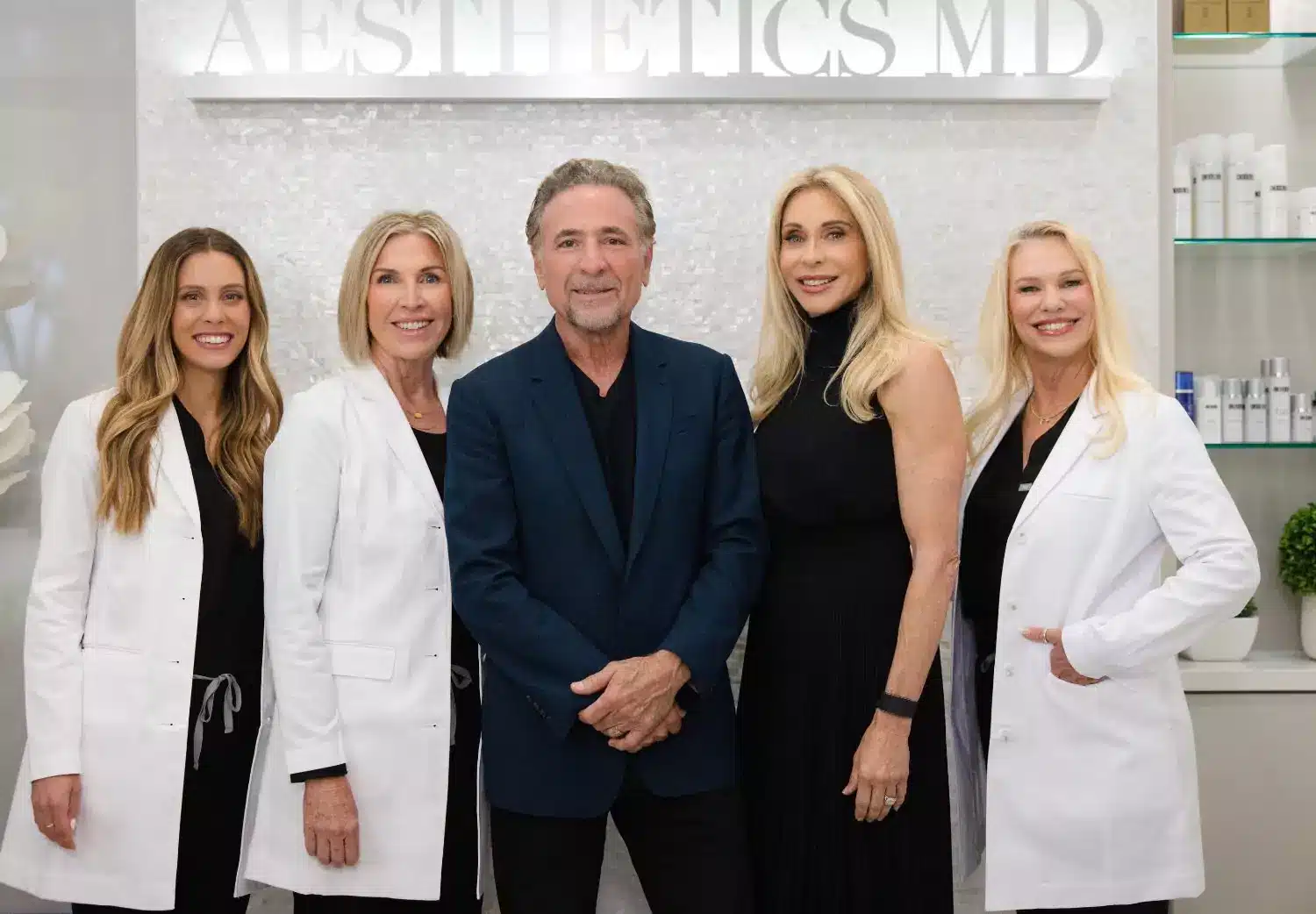If your skin doesn’t bounce back the way it used to, you’re not imagining it. Your collagen levels are likely decreasing! Collagen is the protein that gives your skin structure, strength, and elasticity. It supports the dermis, keeps fine lines at bay, and helps maintain that firm, youthful glow. But like all good things, collagen doesn’t last forever.
Let’s take a closer look at how collagen loss unfolds with age, why it happens, and how our treatments at Aesthetics MD can help restore what time (and the sun) have taken away.
The Collagen Clock: When It All Begins
Your body’s natural collagen production begins to slow down as early as your mid-20s. By your 30s, you may notice the first signs of aging: a change in skin texture, dullness, or emerging fine lines. Collagen levels decrease by about 1% every year after your 30s. That may not sound like much, but over time, it adds up.
In your 40s and 50s, collagen fragmentation becomes more pronounced, and this is where most are concerned of skin aging. You may see deeper wrinkles, loose skin around the jawline, and loss of elasticity in the cheeks and neck. The dermal collagen bundles that once supported a plump, youthful complexion become thinner and more disorganized.
Why Collagen Declines: A Look at the Science
Collagen loss is driven by a combination of intrinsic ageing (your natural biological clock) and extrinsic ageing (external factors like UV exposure and lifestyle choices).
Here’s how it happens:
- UV radiation penetrates the skin and damages collagen fibres, especially in the reticular dermis, damaging skin health.
- Oxidative stress from environmental pollutants and poor nutrition leads to an increase in reactive oxygen species and free radicals, which activate collagen-degrading enzymes such as matrix metalloproteinase 2 (MMP-2).
- Glycation occurs when sugar molecules bind to collagen, forming advanced glycation end products (AGEs) that stiffen skin and disrupt elasticity.
- With age, fibroblasts lose function. Fibroblast aging, reduced DNA repair capacity, and declining telomerase activity all contribute to less collagen production and slower skin healing.
- Cellular senescence, where skin cells stop functioning properly, leads to lower levels of type I procollagen and collagen types I and III, which are vital for smooth, firm skin.
Over time, the extracellular matrix (ECM) weakens, collagen fibrils become fragmented, and fibril formation slows. These changes affect skin texture, skin elasticity, and the overall health of your connective tissues.
How to Support Collagen: Internal and External Tools
While collagen loss is inevitable, you have more control than you think. Supporting your collagen levels can begin from the inside out with the right lifestyle and skincare strategies:
1. Nutraceutical Support
- Collagen supplements (especially marine collagen peptides and hydrolyzed collagen) can help replenish the body’s supply.
- Plant-based supplements and antioxidants like Vitamin C, A, and D, B vitamins, and Aloe Vera in nutraceutical supplements support collagen synthesis and fight oxidative stress.
2. Topical Skincare
- Topical retinoic acid is one of the most well-researched ingredients for boosting collagen in the dermal layers.
- Hyaluronic acid and growth factor serums can plump the skin and maintain hydration, helping to support the surrounding collagen structure.
3. Daily Protection
- UV exposure is a leading cause of photoaged skin, so wearing SPF daily is non-negotiable to protect your papillary dermis and deeper skin layers.
Collagen-Boosting Treatments at Aesthetics MD in Newport Beach
Maintaining a youthful appearance doesn’t always require cosmetic surgery. Our team of aesthetic nurses, led by renowned plastic surgeon Dr. Mark Anton, offers a curated range of aesthetic medicine and skin rejuvenation treatments that target collagen production at a cellular level. These options go beyond topical creams and supplements by addressing dermal collagen deep within the skin:
- NeoGen Plasma: A cutting-edge treatment using nitrogen plasma energy to stimulate collagen fibers, skin regeneration, and long-term skin tightening. It’s excellent for restoring skin elasticity, especially around the upper and lower eyelids through connective tissue remodeling.
- Morpheus8: Combines RF microneedling with radiofrequency treatments to penetrate the dermis and remodel collagen, improving skin texture and firmness.
- Microneedling with PRF: Uses your body’s own platelet-rich fibrin to trigger collagen turnover and healing, supporting smoother, tighter skin.
- IPL (Intense Pulsed Light): Targets sun damage, redness, and age spots while encouraging collagen remodeling in the deeper layers of the skin.
- LaseMD: A laser therapy treatment that enhances the absorption of active ingredients and helps repair UV-damaged dermal connective tissue.
- CellSound: An ultrasound-based system that stimulates fibroblast regeneration, improving collagen density and skin structure over time.
- HydraFacial with Booster Serums: A non-invasive treatment that incorporates peptides, antioxidants, and hyaluronic acid to refresh the skin and support collagen health.
Whether you’re looking for subtle refreshment or more transformative skin rejuvenation, we’ll create a customized treatment plan to fit your skin needs and aesthetic goals.
Collagen Loss Can Be Slowed & Reversed with the Right Plan
Aging might be inevitable, but looking tired doesn’t have to be. By understanding the science of collagen decline and choosing the right combination of skincare, supplements, and aesthetic treatments, you can preserve your skin’s resilience for years to come.
Ready to start banking collagen for the future? Book a consultation at Aesthetics MD in Newport Beach and let our expert team guide you toward your healthiest, most radiant skin.





